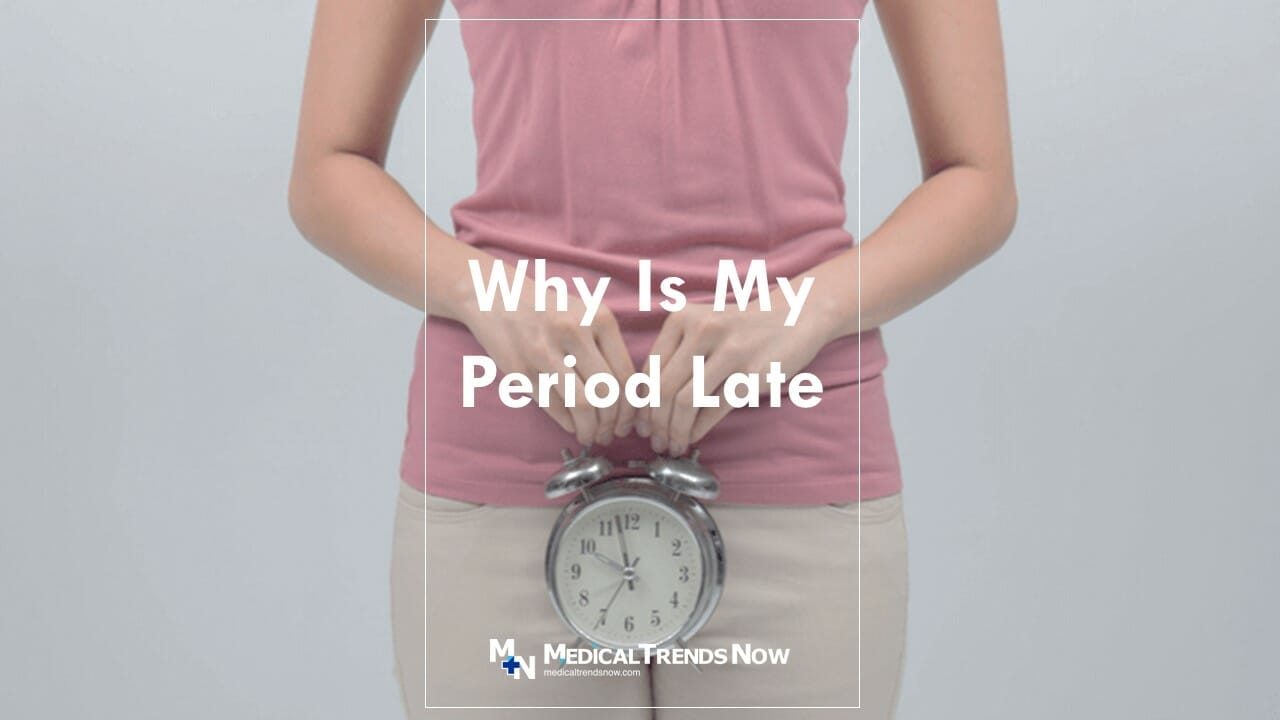Table of Contents
It’s that time of the month again, but this time you’re having another late menstruation period. You may be wondering what could be the reason for this late period. Although there are many possible causes, the most common reason for a late period is pregnancy. Other causes can include stress, weight gain or loss, illness, and certain medications. If you think you might be pregnant, take a home pregnancy test and see your doctor in the Philippines to confirm.
What Is Menstruation Period?
Menstruation is the process by which the Filipina’s uterine lining is shed. The average length of a menstrual cycle is 28 days, but it can vary from person to person. The first day of the menstruation period is considered Day 1 of the cycle.
During the menstruation period, the body sheds the endometrium, which is the tissue that lines the uterus. This shedding occurs because the egg that was released during ovulation was not fertilized. The shedding of the endometrium is what causes women to experience vaginal bleeding.
The average length of time that a woman bleeds during her period is five days, but it can range from two to seven days. Menstrual flow usually starts out light and becomes heavier as the days go on. Towards the end of a woman’s period, her flow will start to lighten again.

What Is A Late Menstruation Period?
When a Filipina woman’s menstrual cycle does not occur when expected, it is called amenorrhea. Amenorrhea can be classified as primary or secondary. Primary amenorrhea is when a woman has never had a period, and secondary amenorrhea is when a woman has missed three or more periods in a row.
There are a few different things that could be considered a late menstruation period. The first is if a woman has a period that is longer than seven days. This is considered to be late and may be a sign of an underlying health condition. Another thing that could be considered late is if a woman has a period that is heavier than normal. This can also be a sign of an underlying health condition and should be discussed with a doctor. Lastly, if a woman misses her period for three months or more, this is also considered to be late and may indicate something more serious such as pregnancy or menopause. If any of these things occur, it is important to speak with a doctor to determine the cause.

Causes Of Late Menstruation Period
There are many potential causes of the late menstruation period among women in the Philippines. One common cause is stress. When a woman experiences stress, her body releases a hormone called cortisol. This hormone can interfere with the release of other hormones, including those that trigger ovulation. Other possible causes of late menstruation include changes in diet or exercise habits, weight gain or loss, illness, and certain medications. As a result, ovulation may be delayed or even halted altogether.
In most cases, late menstruation is nothing to be concerned about. However, if you are trying to conceive, this can be frustrating. If you have unprotected sex and do not want to become pregnant, be sure to use a backup method of birth control. A late menstruation period can also be a sign of perimenopause or menopause. If you are in your 40s or older and experiencing other menopausal symptoms, speak with your doctor about treatment options.
Other potential causes of the late menstruation period include polycystic ovary syndrome (PCOS), thyroid disorders, and certain types of cancer. PCOS is a condition in which the ovaries produce too much testosterone, which can interfere with ovulation. Thyroid disorders can also disrupt the menstrual cycle by causing changes in hormone levels. And finally, certain types of cancer (including ovarian and endometrial cancer) can cause changes in hormone levels that lead to late or absent periods.

Who Is At Risk Of Getting Of Late Menstruation Period
There are many reasons why a Filipina might experience a late menstruation period. Anyone can be at risk, but there are some groups of people who are more likely to experience this problem.
Pregnant women are one group that is at risk. This is because the pregnancy itself can cause changes in the body that delay the menstruation period. In some cases, a late menstruation period can be a sign of a miscarriage.
Another group of people who are at risk is those who have recently given birth. This is because the body needs time to recover from the pregnancy and delivery before it starts ovulating again. It can take several months for ovulation to resume, so a late menstruation period is common in the first few postpartum months.
Those who are breastfeeding are also at risk of a late menstruation period.

Treatment For Late Menstruation Period
It’s not uncommon for your period to be a few days late. Life gets in the way, and sometimes our bodies need a little extra time to rebalance. But if you’re more than a week late, it might be time to take a pregnancy test—and if that’s negative, there are other potential causes for your delayed period.
The late menstruation period is a common problem that many Filipino women face. There are many different treatments that can be used to help ease the symptoms and bring about a normal menstrual cycle. Some of the most common treatments include:

Hormonal therapy:
This treatment involves taking hormone replacement drugs to help regulate the body’s hormone levels. This can often be very effective in helping to restore a normal menstrual cycle.
Birth control pills:
Birth control pills can be helpful in regulating the body’s hormone levels and can also help to reduce the symptoms of the late menstruation period.
Diet and lifestyle changes:
Making changes to a Filipina diet and lifestyle can often help to improve the symptoms of a late menstruation period. Eating a healthy diet and getting regular exercise can often make a big difference.

Home Remedies
There are many different ways that people can try to treat their late menstruation period. Some Filipino women may turn to natural remedies, while others may seek out medical help. Here are some of the most common natural remedies for late menstruation:
Herbal teas:
Herbal teas can help to regulate the menstrual cycle and promote a healthy flow among women in the Philippines. Some of the most commonly used herbs for this purpose include chamomile, ginger, and raspberry leaf.
Dietary changes:
Making some simple dietary changes can also be helpful for treating the late menstruation period. Cutting out processed foods and eating more fresh fruits and vegetables can help to balance hormones and encourage a regular cycle.
Exercise:
Getting regular exercise is another great way to encourage a healthy menstrual cycle. Exercise helps to release endorphins, which can help to alleviate cramping and pain.
Relaxation techniques:
Stress can be one of the biggest contributors to irregular periods. Learning how to relax and manage stress can go a long way in promoting regularity.
Taking a warm bath, drinking plenty of fluids, and eating a healthy diet also helps
Taking a warm bath can help to relax the muscles and ease cramping. Drinking plenty of fluids, especially water, can help to flush out the system and bring on your period. Eating a healthy diet with plenty of vegetables and fruits can also help to regulate your cycle.

Prevention For Late Menstruation Period
There are many different things that can contribute to a late menstruation period among Filipino women. Stress, travel, and diet are just a few of the common culprits. However, there are some things that you can do to help prevent a late menstruation period.
First, it is important to reduce stress in your life (not your hubby). This can be accomplished by exercise, relaxation techniques, or even just taking some time for yourself each day.
Secondly, if you are planning on traveling, be sure to plan ahead and allow yourself plenty of time to adjust to the new time zone.
Finally, watch what you eat and drink. Caffeine and alcohol can both contribute to the late menstruation period.

What Food Or Drinks To Avoid Irregular Periods?
A late period can be frustrating and worrying. There are a number of possible reasons for a late period, but one often overlooked cause is food and drink. Certain foods and drinks can delay or disrupt the menstruation period, so it’s important to be aware of what to avoid if you’re trying to get your period on track.
Caffeine is a common culprit for delayed periods among Filipino women. Coffee, tea, energy drinks, and chocolate can all contain caffeine, and it can have a major impact on your menstrual cycle. Caffeine can make your body produce less estrogen, which can delay ovulation and cause your period to be late.
Another potential problem food is soy. Soy contains plant estrogens (phytoestrogens) that can mimic the effects of human estrogen in the body. This can lead to hormonal imbalances that can disrupt the menstrual cycle.

When To See A Doctor For A Late Period?
If you’re wondering whether you should see a Filipino doctor for your late period, the answer is probably yes. Here are a few things to keep in mind:
- If you’re sexually active, it’s important to rule out pregnancy. This is especially true if you’ve been having unprotected sex or if your period has been irregular in the past.
- If you’re not sexually active, there could be other underlying causes for your late period, such as stress or a change in diet or exercise habits.
- If you have any other symptoms along with your late menstruation periods, such as fatigue, nausea, or breast tenderness, this could be a sign of an underlying health condition, and you should definitely see a doctor.
There could also be an underlying medical reason for your late period, such as polycystic ovary syndrome (PCOS) or uterine fibroids. PCOS is a hormonal disorder that can cause missed or irregular periods, while uterine fibroids are non-cancerous growths that can develop in the uterus and cause heavy bleeding.
Your doctor will be able to perform tests to determine the cause of your late period and recommend treatment options.

Which Doctor Can Treat Irregular Periods?
There are a few different types of doctors in the Philippines who can treat irregular periods. One type of Filipino doctor is an OB-GYN. These doctors specialize in women’s reproductive health and can help diagnose and treat any issues with the menstrual cycle.
Another type of doctor in the Philippines that can treat late periods is a primary care physician. These Filipino physicians can also help to diagnose and treat any underlying causes of late menstruation.
Lastly, there are endocrinologists. These Pinoy doctors specialize in hormone disorders, which can sometimes be the cause of the late menstruation period. If you are experiencing a late menstruation period, it is best to consult with one of these types of doctors to find out the cause and get treatment.

Final Thoughts: Late Menstruation Period
In conclusion, there are many potential reasons why someone might experience a late menstruation period. It is important to consult with a medical professional to rule out any underlying health conditions. There are also many lifestyle factors that can affect the menstruation period, so it is important to be aware of these as well. Making small changes in lifestyle, such as reducing stress or eating a healthier diet, can often help to regulate menstruation.
Resources: Late Period
- Stopped or missed periods – NHS
- 9 reasons your period is late (if you’re not pregnant) Texas A&M University
- Irregular Periods: Why Is My Period Late? – Penn Medicine
- Menstrual Period – Missed or Late – Seattle Children’s
- Why Is My Period Late? – Cleveland Clinic
- Irregular Periods — What Every Girl Should Know – Modess
- How Can I Delay My Period? – Watsons
- Prevalence of irregular menstruation according to socioeconomic status: A population-based nationwide cross-sectional study – NCBI
- Should I Take Pills to Regulate My Period? (for Teens) – Kids Health
- When You Visit Your Doctor – Irregular Menstrual Periods – Harvard Health
- Menstruation – pain (dysmenorrhoea) – Better Health Channel
- FAST FACTS: Nine things you didn’t know about menstruation – UNICEF
- What are the common treatments for menstrual irregularities? – NIH
- Abnormal Menstruation (Periods): Types, Causes & Treatment – Cleveland Clinic
- How can I delay my period? – NHS
- Medroxyprogesterone: MedlinePlus Drug Information – MedlinePlus
- Making period come faster – methods, pills, lutein, herbs – dimedic
- Menstrual cycle: What’s normal, what’s not – Mayo Clinic
- Periods and fertility in the menstrual cycle – NHS
- Menstrual Cycle – Women’s Health Issues – MSD Manuals
Disclaimer
This website is intended to educate both members of the general public and those working in the medical field on the prevalence, causes, and methods for preventing, diagnosing, and treating diseases that affect people throughout their lives. This website’s content is provided solely for informational reasons and is not meant to serve as a substitute for the advice of a qualified medical practitioner.













